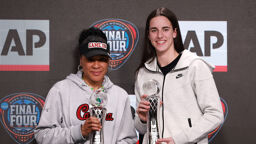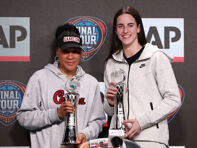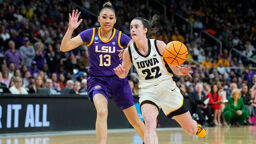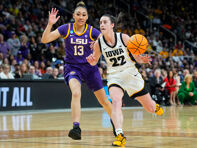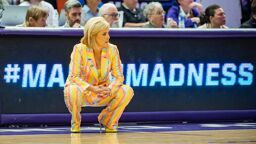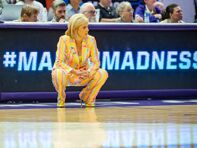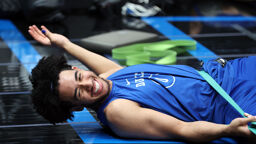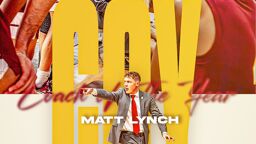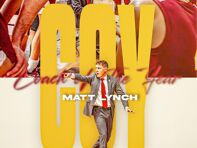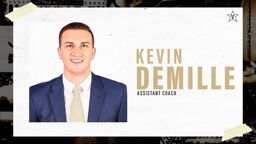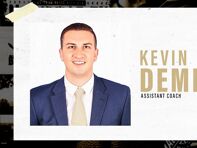New York Liberty player and WNBA All-Star Layshia Clarendon spoke with ESPN’s Sarah Spain on her podcast That’s What She Said in May 2020. Their hour-long conversation touched on a wide range of topics, and here are some excerpts from that interview, featuring Clarendon’s powerful coming out story.
Clarendon came out not all at once but, “more in little spurts,” he said. “A lot of times coming out is like, I’ll be out in this little space, but not to parents, but I’d be out to teammates. I’d be out in some basketball spaces, but not ones where I knew those parents clearly weren’t accepting, but their daughter might know, you know? Their daughter is probably a little gay too, so we had an understanding, but we weren’t out to their parents.
“I wasn’t out to my family and they were super, at the time, homophobic…”
“At school I remember kind of gravitating towards one of my teachers who led the gay-straight alliance, but I never joined it because obviously I would’ve outed myself at school. It was kind of between two worlds where people know, but you’re not talking about it, but you’re not gonna do the overt political acts that I do now where I am screaming it to the mountaintops. It was kind of fluttering between two worlds, which is oftentimes how the coming out process works.
“I wasn’t out to my family and they were super, at the time, homophobic, like, ‘This is not okay.’ So that was a level of like, shit, I gotta get out of here and get somewhere that I could be more out. I wanted to be out, and I wanted to be open, but it was like a survival tactic. I knew there were gay players in my same recruiting class that were going to Cal, so that was a big part of it. People always use recruiting as a negative tool, that there’s queer players or coaches and stuff, but it actually worked in the benefit.
“I was a California State player and I went to Berkeley because I knew my teammates around me, there were queer people going there, and I knew that would be okay. And our head coach at the time, Joanne Boyle, was super affirming. She was a straight, white, Christian woman and I was out to her before I even went to Cal, and she was like, ‘You’re okay to be who you are.’ I talked to her about not being out to my family, about how tough it was, about how when my sister came out, it was difficult, and it kind of put a rift in the family. She was just super affirming, so I knew I could go to Cal and I could be okay, I could be safe.
“‘Mom! I’m the same person, come on.’ So we were kind of okay. She cried, it was this big drama…”
“I came out to my brother when I was in college, and he was totally fine. He’s younger than me, he’s five years younger… He was totally fine with it, like, ‘I love you.’ And I came out to my sister earlier than that, kind of like, ‘I am what you are,’ but I still didn’t have all the words for it. She kind of knew, but we didn’t really talk about it. Then I came out to my mom in [sophomore] year and one of the first things she said to me was, ‘Please don’t tell your dad,’ because it was that strong of a, ‘Oh, no, this is gonna cause another problem in the family.’
“She was always a little more relaxed on it, kind of, I think, supporting my dad a little bit, but less so that she really believed it was wrong, and so I was just like, ‘Mom! I’m the same person, come on.’ So we were kind of okay. She cried, it was this big drama… And then I told my dad my junior year, on National Coming Out Day, actually, by accident. I didn’t know it was National Coming Out Day! We were supposed to go to Hawaii for a basketball tournament around Thanksgiving and I asked him, ‘Would you come if you knew I was gay?’
“And he was like, ‘No!’ And I was like, ‘Well, I guess you’re not coming!’ I feel bad that it was such a terse way to come out to your dad, but at that point I was just so sick and tired of living for other people. At that point I’d been pretty immersed in my church and feeling better about who I was and solid in my identity. I’m just like, this is bullshit! I am who I am, God loves me, I’ve always been this person — and that’s what I was telling him when he called me and tried to use religion. At this point I was like, ‘Dad, I go to church. You can’t tell me God doesn’t love me. I know that.’ So those weapons weren’t available anymore. I really just was like, ‘I’m the same person. This is who I’ve always been.’
“In some ways, basketball really saved me and gave me the only really safe community I had growing up, a place to be queer and be okay.”
“My dad is so much more accepting, he’s asked for forgiveness, he’s, I think, just come to a place where he’s just accepted me for who I am… Eventually he just got to a place where he saw that this is who I am and who I’ve always been, and so we’re in a much better place. I’ve always been such a daddy’s girl, so it was really hard growing up to be seen in so many ways in sport, and to have his love, but to not have it in the way of like, ‘But would you love me if you knew this one secret part of me?’
“For my dad, it was a little bit like he felt like he created two gay kids by putting them in sports. And it’s really interesting, because my sister is super femme, like she could’ve been a cheerleader, she’s a diva, makeup, hoop earrings, wearing her hair… And I’m the opposite! So I was like, ‘Dad, it doesn’t matter!’ Because he’s assuming like, ‘I made you gay, you’re boyish.’ We’re total opposites, but we both are, and it’s not your fault. In some ways, basketball really saved me and gave me the only really safe community I had growing up, a place to be queer and be okay.”
Click here to listen to Sarah Spain’s May 2020 interview with Layshia Clarendon for their wonderful, wide-ranging conversation on pushing the WNBA to promote their out athletes, being gender nonconforming, and much more.
Editor’s note: Since we first published this story in June 2020, Clarendon has come out as trans and non-binary, revealed they had top surgery and celebrated the birth of their first child, Baby C, on Christmas. We’ve made some edits here to reflect that Clarendon uses he/him/she/her/they/them pronouns interchangeably.



